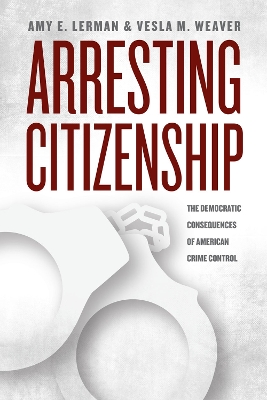Chicago Studies in American Politics
2 total works
American government is in the midst of a reputation crisis. An overwhelming majority of citizens--Republicans and Democrats alike--hold negative perceptions of the government and believe it is wasteful, inefficient, and doing a generally poor job managing public programs and providing public services. When social problems arise, Americans are therefore skeptical that the government has the ability to respond effectively. It's a serious problem, argues Amy E. Lerman, and it will not be a simple one to fix.
With Good Enough for Government Work, Lerman uses surveys, experiments, and public opinion data to argue persuasively that the reputation of government is itself an impediment to government's ability to achieve the common good. In addition to improving its efficiency and effectiveness, government therefore has an equally critical task: countering the belief that the public sector is mired in incompetence. Lerman takes readers through the main challenges. Negative perceptions are highly resistant to change, she shows, because we tend to perceive the world in a way that confirms our negative stereotypes of government--even in the face of new information. Those who hold particularly negative perceptions also begin to "opt out" in favor of private alternatives, such as sending their children to private schools, living in gated communities, and refusing to participate in public health insurance programs. When sufficient numbers of people opt out of public services, the result can be a decline in the objective quality of public provision. In this way, citizens' beliefs about government can quickly become a self-fulfilling prophecy, with consequences for all. Lerman concludes with practical solutions for how the government might improve its reputation and roll back current efforts to eliminate or privatize even some of the most critical public services.
With Good Enough for Government Work, Lerman uses surveys, experiments, and public opinion data to argue persuasively that the reputation of government is itself an impediment to government's ability to achieve the common good. In addition to improving its efficiency and effectiveness, government therefore has an equally critical task: countering the belief that the public sector is mired in incompetence. Lerman takes readers through the main challenges. Negative perceptions are highly resistant to change, she shows, because we tend to perceive the world in a way that confirms our negative stereotypes of government--even in the face of new information. Those who hold particularly negative perceptions also begin to "opt out" in favor of private alternatives, such as sending their children to private schools, living in gated communities, and refusing to participate in public health insurance programs. When sufficient numbers of people opt out of public services, the result can be a decline in the objective quality of public provision. In this way, citizens' beliefs about government can quickly become a self-fulfilling prophecy, with consequences for all. Lerman concludes with practical solutions for how the government might improve its reputation and roll back current efforts to eliminate or privatize even some of the most critical public services.
One-third of America's adult population has passed through the criminal justice system and now has a criminal record. Many more have never been convicted, but are still subject to surveillance by the state. Never before has the government maintained so vast a network of institutions dedicated solely to the control and confinement of its citizens. A provocative assessment of the contemporary carceral state, Arresting Citizenship argues that the broad reach of the criminal justice system has recast the relation between citizen and state, resulting in a sizable-and growing-group of second-class citizens. From police stops to court cases and incarceration, at each stage of the criminal justice system, disempowered individuals belonging to this group experience a state-within-a-state that reflects few of the country's core democratic values. The authors show how this contact with police, courts, and prisons decreases faith in the capacity of American political institutions to respond to citizens' concerns and diminishes the sense of equal citizenship - even for those not found guilty of any crime.
They go on to offer concrete proposals for reforms to reincorporate this large group of citizens as active participants in American political life.
They go on to offer concrete proposals for reforms to reincorporate this large group of citizens as active participants in American political life.

